
Emergency Wisdom Tooth Extraction Services by Sonria Dental Clinic
Wisdom teeth usually break through your gums between the ages of 17 and 25. Sometimes wisdom teeth come out in alignment with your other teeth and do not cause any problems. Other times, they become either partially, or fully, trapped in your gums or jawbone. This is referred to as impaction. Impacted wisdom teeth can cause a variety of oral health problems, including cavities, gum disease and infection.
Surgical removal is often recommended as treatment for impacted wisdom teeth.
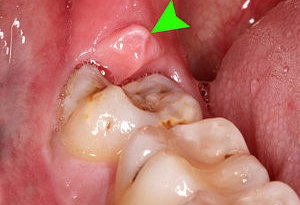
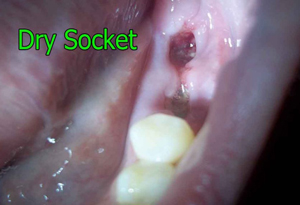
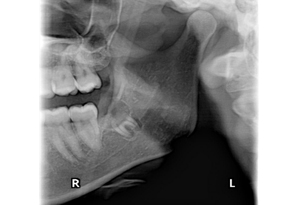
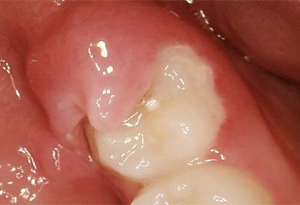
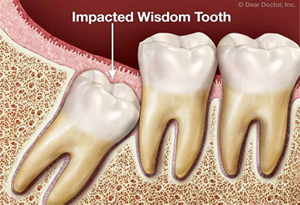
Signs of impacted wisdom teeth include:
If your impacted teeth are causing pain, infection or other dental issues, removal is usually recommended. Many dentists recommend this oral surgery procedure as a preventative measure to reduce the risk of problems in the future.
While impacted wisdom teeth are generally more difficult to remove, the process is not necessarily more painful. Your dentist or oral surgeon will give you pain relievers to manage any post-operative discomfort.
Like any surgical procedure, wisdom teeth removal comes with some potential risks and complications. These include:
If your wisdom teeth are impacted but are not causing any problems, you probably do not need to remove them. Impacted wisdom teeth are more prone to infection and abscesses and they can cause damage, decay and disease to healthy teeth. However, if you start developing symptoms, removing them can reduce your risk of other issues and improve your overall oral health.
If you have pain or other symptoms affecting the area behind your last molar, schedule an appointment with your dentist. They can determine if your issues are due to impacted wisdom teeth.
Impacted wisdom teeth can cause a wide range of symptoms, including swelling, bad taste and pain that radiates throughout your jaw and face. Wisdom teeth removal is a common surgery procedure that can ease your symptoms and reduce the risk of future oral health problems. Talk with your dentist about whether this treatment is right for you.
Most people fully recover from wisdom teeth removal in one to two weeks. In most cases, you can return to work, school and other normal routines in just a few days.
If you are experiencing severe pain or discomfort from your wisdom teeth, you should make an appointment with your dentist as soon as possible. Check out our article on what to do when you have a dental emergency.
Your dentist will be able to check your teeth and advise you on further treatment and whether they will need to be removed or not.
As mentioned not all wisdom teeth will cause pain or problems. However, some impacted wisdom teeth that have not fully broken through the surface of the gum can cause problems. This is normally due to food and bacteria getting trapped around the edges and crevices caused by the breaking of the gum, which in turn causes infection and decay.

The best way and, more often than not, the only way to treat a toothache is to go and see your dentist. Then you can be certain you are getting the safe and required treatment you need. However, until you get an appointment with your dentist there are a few ways to treat wisdom teeth pain at home.
Dental surgeons extract wisdom teeth as either a preventive measure or to correct issues caused by how the teeth have erupted.
Wisdom teeth that have emerged completely can be extracted relatively easily by simply pulling them out with forceps. Misaligned or impacted wisdom teeth may entail removal of each tooth bit by bit, making an incision in the gum, and drilling out bone.
If your dentist thinks you may need your wisdom teeth removed, they will usually carry out an X-ray of your mouth. This gives them a clearer view of the position of your teeth and the relative ease at which they can be removed.
Depending on the level of difficulty of the procedure, wisdom teeth removal will involve local or a general aesthetic. Before the procedure, you will usually be given anaesthesia to numb the area around the tooth. You will feel some pressure just before the tooth is removed, but apart from that the procedure should be entirely painless thanks to modern medicine and a calm hand of an experienced dentist. In some cases, an incision may be needed in your gum, and the tooth may need to be cut into smaller pieces before it is removed. The time it takes to remove the tooth will vary. Some procedures only take a few minutes, whereas others can take an hour or longer.
Recovery time after a wisdom tooth extraction varies from person to person. It also depends on the complexity of the procedure, the type of anaesthesia and how much harm the problem has caused to the rest of your mouth.
After your wisdom teeth have been removed, you may experience some swelling and discomfort. This can be on both the inside and outside of your mouth lasting for between 1 or 2 weeks.
If you’re considering wisdom teeth extraction, look for a dental practice that specializes in the procedure. If you wait longer than early adulthood to have wisdom teeth extracted, the complications and risks associated with the procedure – including nerve damage – are likely to increase. Recovery will also take longer.
Most people do not need a follow-up appointment after having a wisdom tooth removed. Your surgeon will decide. On the day of your surgery, we arrange any follow-up appointment that you might need.
You cannot stop your wisdom teeth coming through, but there are things you can do to make sure the gums are less likely to become infected.
Up to 1 in 10 people that we see with wisdom tooth problems have gum disease. You might not have symptoms, but this can still cause problems.
When wisdom teeth emerge crooked, they can cause other teeth to shift and damage them.
The roots of upper wisdom teeth can put pressure on the sinuses – the system of connected cavities in the skull. This can result in sinusitis, congestion, and headaches.
Wisdom teeth extraction becomes more complex once the roots are fully established. People still in their teens have less developed tooth roots, so removal of wisdom teeth then will result in fewer complications. Recovery time is also faster in younger patients.
Our modern diet of softer foods than our ancestors had to chomp on – such as plant roots and uncooked food – has made wisdom teeth redundant. Scientists class them as vestigial organs that serve no purpose.
Individuals who decide to keep their wisdom teeth will need constant monitoring by their dentist.